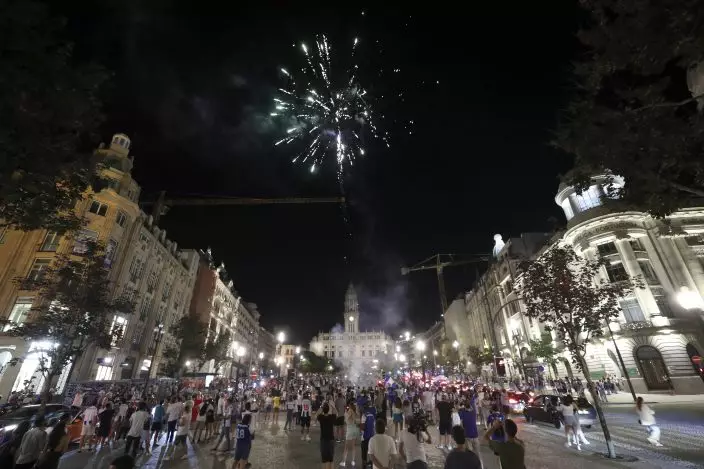Portugal is taking center stage for soccer during the next two weeks — a country where rivalries between clubs go well beyond the field of play.
The decisive stages of the Champions League will begin on Wednesday in the southern European nation where back-and-forth accusations and legal actions involving the country’s top teams are routine.
Club officials are not afraid of attacking each other publicly. The government is often probing teams for alleged wrongdoing. Not even players and their agents are free from controversy.

FILE - In this July 16, 2020 file photo, FC Porto fans celebrate in downtown Porto, Portugal, after their team beat Sporting CP 2-0 to win the championship. Portugal is taking center stage for soccer during the next two weeks — a country where rivalries between clubs go well beyond the field of play. The decisive stages of the Champions League will begin on Wednesday Aug. 12, 2020, in the southern European nation where back-and-forth accusations and legal actions involving the country’s top teams are routine. (AP PhotoMiguel Angelo Pereira, File)
It wasn’t long ago that search-and-seizure operations took place simultaneously at the headquarters of Benfica, Porto and Sporting Lisbon, the country’s three biggest clubs. It happened just before the coronavirus pandemic struck, as authorities investigated possible tax fraud and irregularities in soccer in an operation called “Offside.”
Presidents of all three clubs have been accused of some sort of wrongdoing over the past years, though they have always claimed innocence and actual convictions have been rare.
Benfica, a two-time European champion in the 1960s and Portugal’s most successful club with 37 league titles, has been targeted in more than a handful of cases in the last five years. Trading of its shares was temporarily suspended last month after the latest accusations were made against the club over alleged tax fraud.
Benfica is coming off one of its biggest legal victories, though, in a 2019 high-profile case in which a Porto media officer was accused of systematically releasing information from internal emails obtained from the rival.
Porto was ordered by a judge to pay nearly 2 million euros ($2.3 million) in damages to Benfica, as well as to return any documents it still possessed related to the case. Porto said at the time the emails showed a corruption scheme that benefited Benfica, something that has not been proven in court. Porto claimed it only released information that the court itself had considered to be true.
Details about the case were constantly discussed in sports shows and across Portuguese media outlets, which often resort to anonymous sources to publish information about court cases involving the clubs.
After a recent round of accusations against Benfica president Luís Filipe Vieira were published by local media, the club’s lawyers released a statement lamenting the way the official was being publicly scrutinized.
“It’s regrettable,” the statement said. “Judgments are being made in the court of public opinion and in the media. Justice would be better served if everyone kept to their own businesses.”
Benfica, the nation’s most popular club, has also faced accusations – not yet proven -- related to alleged match-fixing and corruption of referees. Some of them were made public by former Sporting Lisbon president Bruno de Carvalho, who himself was accused of wrongdoing while in charge of his club.
Among the charges De Carvalho faced was masterminding a fans' attack on players who were at odds with him. About 50 fans with their faces covered forced their way into the team’s training center and assaulted players and staff in the incident that made worldwide headlines two years ago.
De Carvalho, who reportedly used to belong to a radical fan group, was detained but denied any wrongdoing and eventually was found not guilty.
Porto president Jorge Nuno Pinto da Costa earlier this year denied wrongdoing after a local magazine said the club and high-profile agent Jorge Mendes were being investigated for tax fraud and money laundering related to the transfer of players such as Radamel Falcão and Iker Casillas. Mendes is the agent of Portugal star Cristiano Ronaldo.
Porto said at the time that neither the club nor Costa were ever approached by authorities about the investigation. It said the timing of the release of the information was suspicious, coming just before a decisive Portuguese league match against rival Benfica.
Porto, the European champion in 1987 and 2004, is the second most successful club in Portugal with 29 league titles, including the one it won this season after the league resumed amid the coronavirus pandemic. Sporting is next with 18 league titles. Only two other clubs outside the top three have won the Portuguese league — Belenenses in 1946 and Boavista in 2001.
They will all take a backseat during next two weeks as the Champions League arrives. And maybe, just maybe, their off-the-field controversies will be put aside for a while as well.
More AP soccer: https://apnews.com/Soccer and https://twitter.com/AP_Sports
Tales Azzoni on Twitter: http://twitter.com/tazzoni


